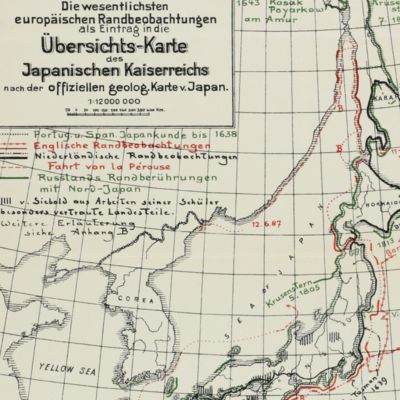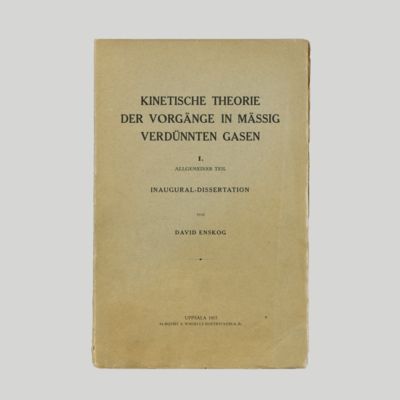Haushofer, K.
Der deutsche Anteil und der geographischen Erschließung Japans und des Subjapanischen Erdraums, und deren Förderung durch den Einfluß von Krieg und Wehrpolitik.
Erlangen, Junge & Sohn, 1914. 8vo (24.2 x 16.0 cm). 110 pp.; two folded maps, several text figures and maps. Original printed wrappers.
The author's thesis, or "Inaugural-Dissertation". Karl Haushofer (1869-1946) was a major in the Royal Bavarian Army and, during WWI, a major general in the German army. He travelled widely through southeast Asia and India, and later (1908-1910) in Japan, Korea, Siberia and China (Manchuria). "Haushofer entered academia with the aim of restoring and regenerating Germany. Haushofer believed the Germans' lack of geographical knowledge and geopolitical awareness to be a major cause of Germany’s defeat in World War I, as Germany had found itself with a disadvantageous alignment of allies and enemies. The fields of political and geographical science thus became his areas of specialty. In 1919, Haushofer became Privatdozent for political geography at Munich University and in 1933 professor.... After the establishment of the Nazi regime, Haushofer remained friendly with Hess, who protected Haushofer and his wife from the racial laws of the Nazis, which deemed her a "half-Jew". During the pre-war years, Haushofer was instrumental in linking Japan to the Axis powers, acting in accordance with the theories of his book Geopolitics of the Pacific Ocean. ... After the July 20 Plot to assassinate Hitler, Haushofer's son Albrecht (1903-1945) went into hiding but was arrested on 7 December 1944 and put into the Moabit prison in Berlin. During the night of 22-23 April 1945, he and other selected prisoners, such as Klaus Bonhoeffer, were walked out of the prison by an SS-squad and were shot. Beginning on 24 September 1945, Karl Haushofer was informally interrogated by Father Edmund A. Walsh on behalf of the Allied forces to determine whether he should stand trial at Nuremberg for war crimes; Walsh determined that he had not committed any. On the night of 10-11 March 1946, he and his wife committed suicide in a secluded hollow on their Hartschimmelhof estate at Pähl/Ammersee. Both drank arsenic and his wife then hanged herself while Haushofer was obviously too weak to do so" (Wikipedia). Staples a bit rusty; therwise a very good, clean copy. Rare.





